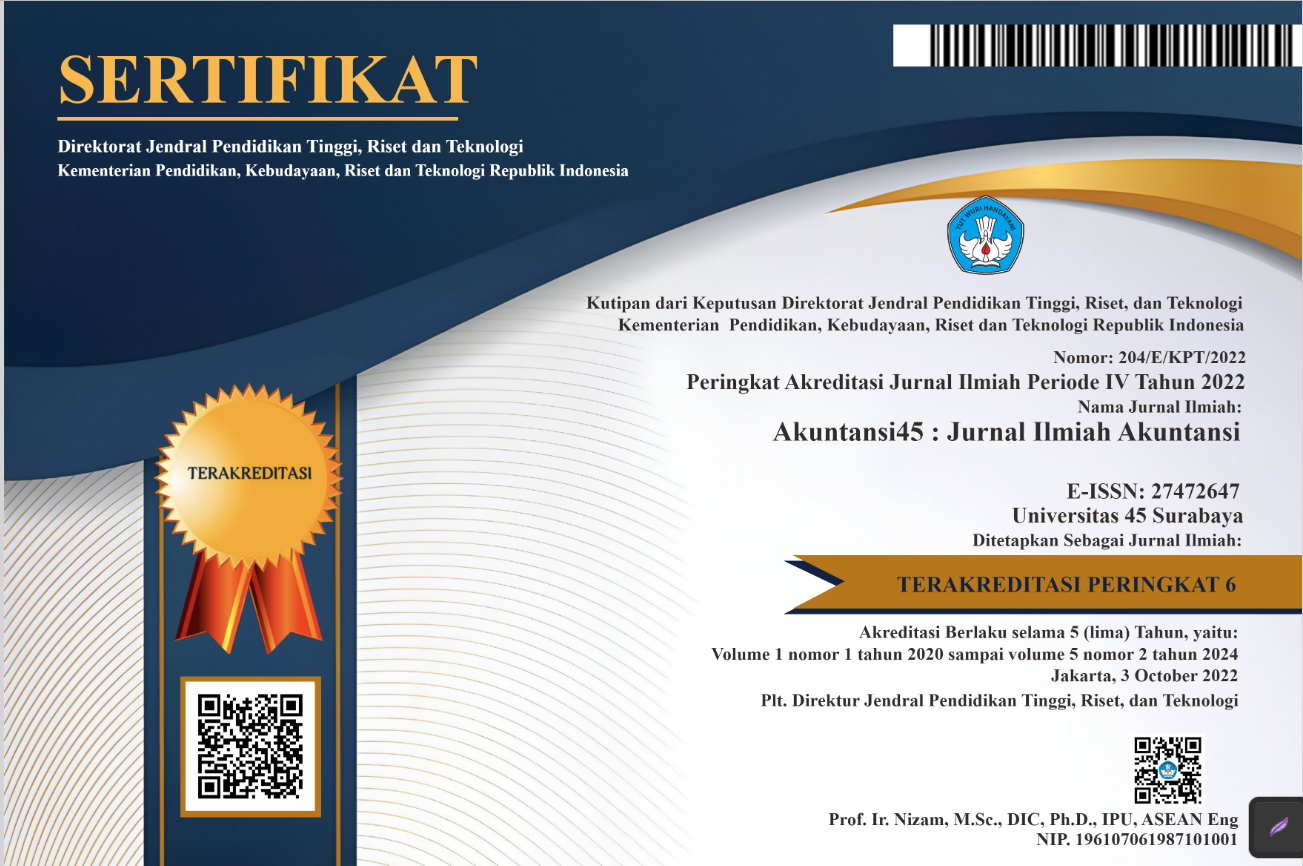Pengaruh Isu Overtourism Terhadap Sustainable Tourism Yang Ada di Bali
DOI:
https://doi.org/10.30640/akuntansi45.v5i2.3358Keywords:
Overtourism, Bali, Tourism, PandemicAbstract
Abstract The global economy has suffered as a result of the COVID-19 health crisis, particularly the travel and tourism industry. The COVID-19 pandemic has caused major losses for the tourism industry. However, as the impact of COVID-19 decreases, current tourism behavior causes the possibility of overtourism. Over the past few years, the desire for “revenge tourism” has increased as a result of negative feelings caused by the COVID-19 pandemic. Excessive tourism also has a negative social impact from a psychological point of view, but from a psychological point of view, it may be due to negative emotions accumulated over a period of time. Bali is also facing poor sustainable tourism development after the drastic economic decline caused by the COVID-19 pandemic. With the excessive increase in the number of tourists, will this have a negative impact on sustainable tourism development in Bali? This research was created to find out whether the overtourism that is being rumored will have an impact on workers for tourism development in Bali after the COVID-19 pandemic occurred several years ago.
References
Aall, C., & Koens, K., “The discourse on sustainable urban tourism: The need for discussing more than overtourism,” “Sustainability (Switzerland)”, vol. 11, no. 15, Aug. 2019, doi: 10.3390/su11154228.
Álvarez-Herranz, A., & Macedo-Ruíz, E., “An evaluation of the three pillars of sustainability in cities with high Airbnb presence: A case study of the city of Madrid,” “Sustain.”, vol. 13, no. 6, Mar. 2021, doi: 10.3390/su13063220.
Amherst, S., Pham, K., Vogt, C., & Andereck, K., “Travel and Tourism Research Association: Advancing Tourism Research Globally.” [Online]. Available: https://scholarworks.umass.edu/ttra/2021/grad_colloquium/4
Cheung, K. S., & Li, L. H., “Understanding visitor–resident relations in overtourism: developing resilience for sustainable tourism,” “J. Sustain. Tour.”, vol. 27, no. 8, pp. 1197–1216, Aug. 2019, doi: 10.1080/09669582.2019.1606815.
Fadli, S., “Sustainability Reporting analysis of Triple Bottom Line Revelations in the Industrial Revolution 4.0,” “Bongaya J. Res. Account.”, vol. 4, no. 1. [Online]. Available: https://ojs.stiem-bongaya.ac.id/index.php/BJRA
Khalid, S., Ahmad, M. S., Ramayah, T., Hwang, J., & Kim, I., “Community empowerment and sustainable tourism development: The mediating role of community support for tourism,” “Sustain.”, vol. 11, no. 22, Nov. 2019, doi: 10.3390/su11226248.
Koens, K., Postma, A., & Papp, B., “Is overtourism overused? Understanding the impact of tourism in a city context,” “Sustain.”, vol. 10, no. 12, Nov. 2018, doi: 10.3390/su10124384.
Made, N. G., et al., “Analisis Tingkat Over Tourism di Kawasan Wisata Sejarah Cirebon”, doi: 10.55701/mandalika.
Maulud, D., & Abdulazeez, A. M., “A Review on Linear Regression Comprehensive in Machine Learning,” “J. Appl. Sci. Technol. Trends”, vol. 1, no. 2, pp. 140–147, Dec. 2020, doi: 10.38094/jastt1457.
Mihalic, T., “Concpetualising overtourism: A sustainability approach,” “Ann. Tour. Res.”, vol. 84, Sep. 2020, doi: 10.1016/j.annals.2020.103025.
Nabila, R., & Arinta, Y. N., “DEVELOPMENT GREEN ECONOMY MODEL FOR WELFARE INDONESIA,” vol. 6, no. 2, 2020.
Maricar, A., & Priyawan, S., “Implementasi Akuntansi Lingkungan Dalam Hubungannya Dengan Konsep Triple Bottom Line Menuju Green Economy Guna Mencapai Keberlanjutan Pada PT Varia Usaha Beton (VUB) Sidoarjo,” “J. Ekon. dan Pembang. Indones.”, vol. 2, no. 1, 2024, doi: 10.61132/jepi.v2i1.244.
Martín, J. M. M., Martínez, J. M. G., & Fernández, J. A. S., “An analysis of the factors behind the citizen’s attitude of rejection towards tourism in a context of overtourism and economic dependence on this activity,” “Sustain.”, vol. 10, no. 8, Aug. 2018, doi: 10.3390/su10082851.
Rafael, S., Mertens, M., Ângelo, P., & Mendes, M., “From overtourism to REC-OVERtourism. A digital experience for sustainable tourism,” in “ACM International Conference Proceeding Series”, Association for Computing Machinery, Sep. 2023. doi: 10.1145/3623462.3623468.
Rama, M., et al., “Balance between Hosts and Guests: The Key to Sustainable Tourism in a Heritage City,” “Sustain.”, vol. 14, no. 20, Oct. 2022, doi: 10.3390/su142013253.
Sánchez-Sánchez, F. J., & Sánchez-Sánchez, A. M., “Ecotourism and COVID-19: Impact on the efficiency of the Spanish hospitality industry,” “J. Outdoor Recreat. Tour.”, vol. 43, Sep. 2023, doi: 10.1016/j.jort.2023.100680.
Stanišić, T., Lazarević, S., & Radivojević, S. V., “COMPETITIVENESS AND SUSTAINABILITY OF TOURISM IN THE EUROPEAN UNION COUNTRIES.”
Stylidis, D., “Exploring Resident–Tourist Interaction and its Impact on Tourists’ Destination Image,” “J. Travel Res.”, vol. 61, no. 1, pp. 186–201, Jan. 2022, doi: 10.1177/0047287520969861.
Sukmadi, V. S., “ANALISIS KEBIJAKAN PEMBANGUNAN PARIWISATA BERKELANJUTAN DI KOTA BANDUNG SELAMA PANDEMI COVID 19 Oleh,” vol. 15, 2021.
Tseng, M. L., et al., “Future trends and guidance for the triple bottom line and sustainability: a data driven bibliometric analysis,” “Environmental Science and Pollution Research”, vol. 27, no. 27, Sep. 01, 2020, doi: 10.1007/s11356-020-09284-0.
Yamin, M., Kamal, I., Primadata, A. P., Rosyadi, S., & Runtiko, A. G., “Overtourism in Indonesia after the COVID-19 Pandemic: Social Psychology Perspective,” “Sociol. y Tecnociencia”, vol. 13, no. 1, pp. 165–186, 2023, doi: 10.24197/st.1.2023.165-186.
Downloads
Published
How to Cite
Issue
Section
License
Copyright (c) 2024 AKUNTANSI 45

This work is licensed under a Creative Commons Attribution-ShareAlike 4.0 International License.









